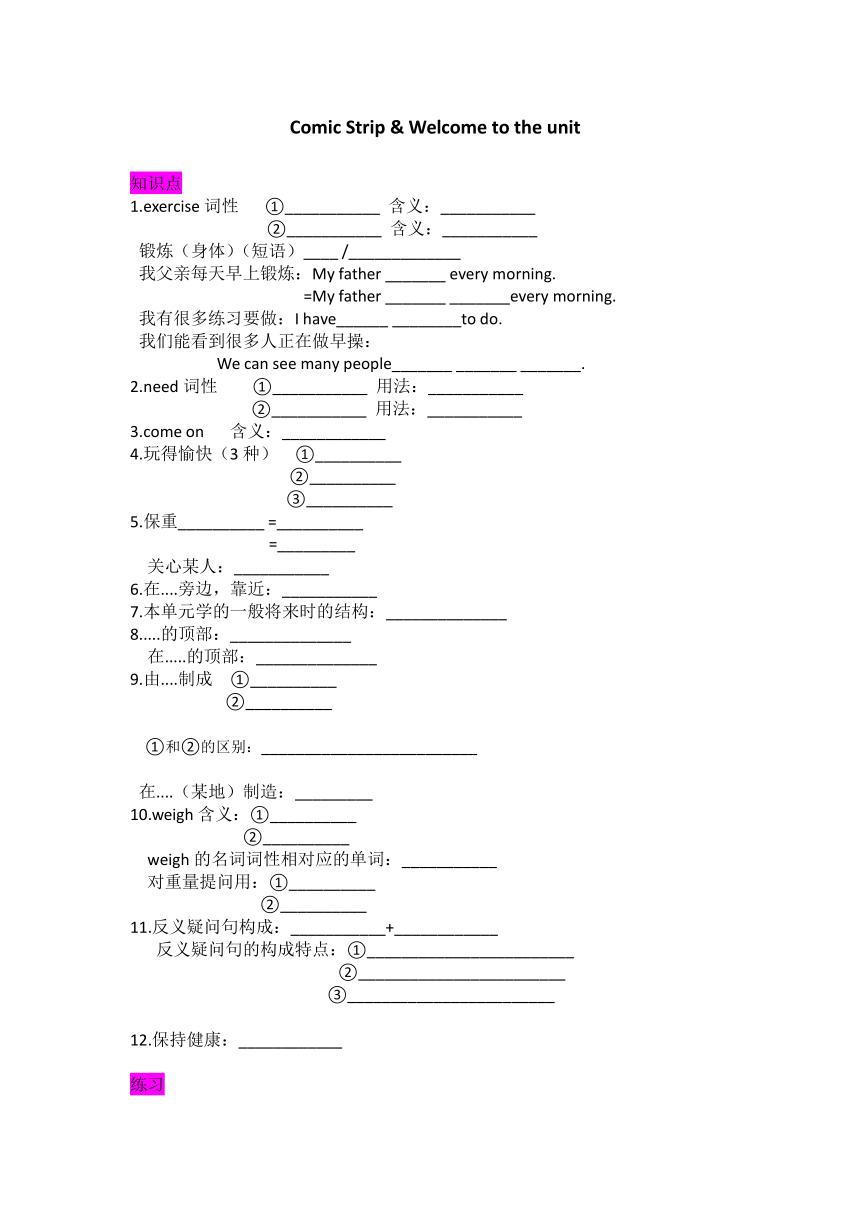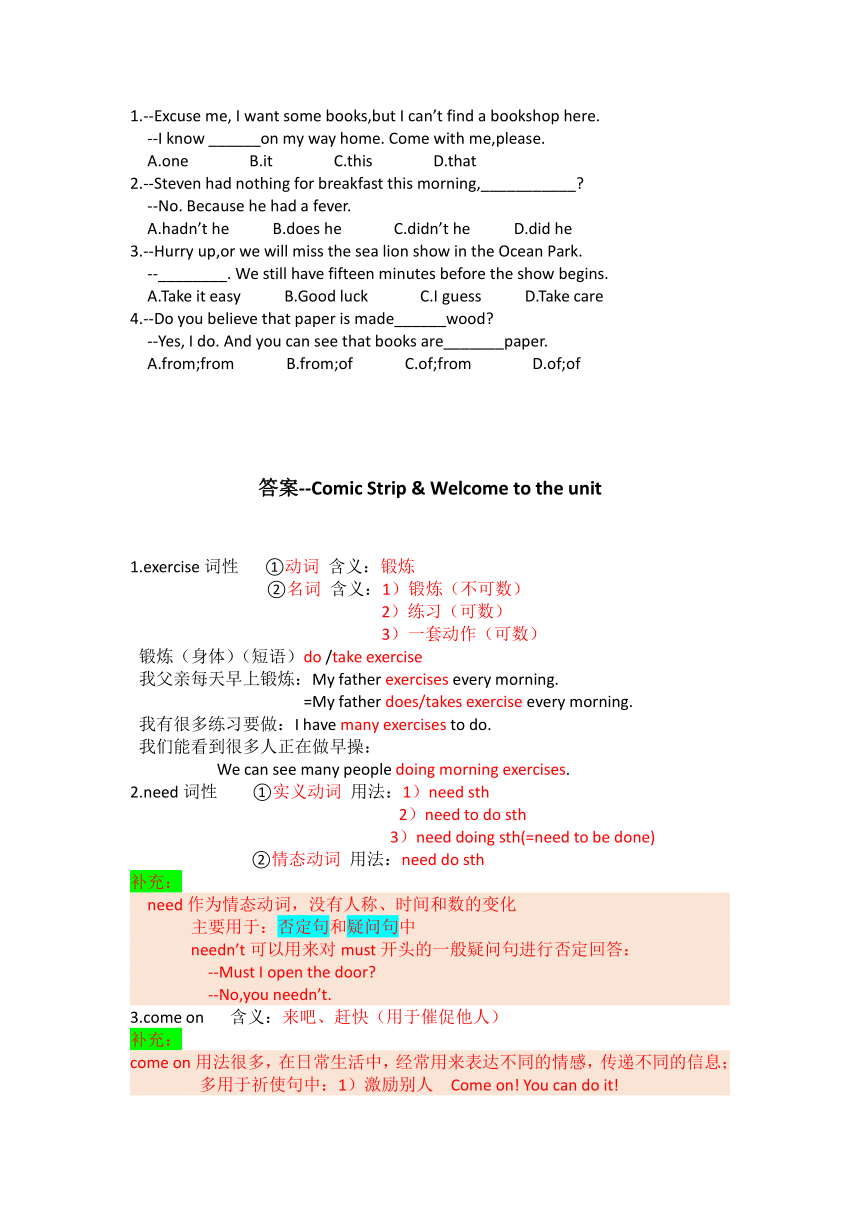八年级上册Unit 3 A day out易错知识点梳理(含答案)
文档属性
| 名称 | 八年级上册Unit 3 A day out易错知识点梳理(含答案) |  | |
| 格式 | zip | ||
| 文件大小 | 41.0KB | ||
| 资源类型 | 教案 | ||
| 版本资源 | 牛津译林版 | ||
| 科目 | 英语 | ||
| 更新时间 | 2021-11-25 14:47:24 | ||
图片预览


文档简介
Comic Strip & Welcome to the unit
知识点
1.exercise词性 ①___________ 含义:___________
②___________ 含义:___________
锻炼(身体)(短语)____ /_____________
我父亲每天早上锻炼:My father _______ every morning.
=My father _______ _______every morning.
我有很多练习要做:I have______ ________to do.
我们能看到很多人正在做早操:
We can see many people_______ _______ _______.
2.need词性 ①___________ 用法:___________
②___________ 用法:___________
3.come on 含义:____________
4.玩得愉快(3种) ①__________
②__________
③__________
5.保重__________ =__________
=_________
关心某人:___________
6.在....旁边,靠近:___________
7.本单元学的一般将来时的结构:______________
8.....的顶部:______________
在.....的顶部:______________
9.由....制成 ①__________
②__________
①和②的区别:_________________________
在....(某地)制造:_________
10.weigh含义:①__________
②__________
weigh的名词词性相对应的单词:___________
对重量提问用:①__________
②__________
11.反义疑问句构成:___________+____________
反义疑问句的构成特点:①________________________
②________________________
③________________________
12.保持健康:____________
练习
1.--Excuse me, I want some books,but I can’t find a bookshop here.
--I know ______on my way e with me,please.
A.one B.it C.this D.that
2.--Steven had nothing for breakfast this morning,___________
--No. Because he had a fever.
A.hadn’t he B.does he C.didn’t he D.did he
3.--Hurry up,or we will miss the sea lion show in the Ocean Park.
--________. We still have fifteen minutes before the show begins.
A.Take it easy B.Good luck C.I guess D.Take care
4.--Do you believe that paper is made______wood
--Yes, I do. And you can see that books are_______paper.
A.from;from B.from;of C.of;from D.of;of
答案--Comic Strip & Welcome to the unit
1.exercise词性 ①动词 含义:锻炼
②名词 含义:1)锻炼(不可数)
练习(可数)
一套动作(可数)
锻炼(身体)(短语)do /take exercise
我父亲每天早上锻炼:My father exercises every morning.
=My father does/takes exercise every morning.
我有很多练习要做:I have many exercises to do.
我们能看到很多人正在做早操:
We can see many people doing morning exercises.
2.need词性 ①实义动词 用法:1)need sth
2)need to do sth
3)need doing sth(=need to be done)
②情态动词 用法:need do sth
补充:
need作为情态动词,没有人称、时间和数的变化
主要用于:否定句和疑问句中
needn’t可以用来对must开头的一般疑问句进行否定回答:
--Must I open the door
--No,you needn’t.
3.come on 含义:来吧、赶快(用于催促他人)
补充:
come on用法很多,在日常生活中,经常用来表达不同的情感,传递不同的信息;
多用于祈使句中:1)激励别人 Come on! You can do it!
表示责备或者不耐烦 Come on! Don’t lie!
给别人加油助威 Come on! Come on!
用于挑衅对方 Come on, then,hit me!
4.玩得愉快(3种) ①enjoy oneself
②have a good time
③have fun
5.保重take care(用于提醒或警示等语气 )
=be careful
=look out
补充:
take care 后还可以跟动词不定式或从句
Take care not to break the glass.
Take care (that) you don’t cross the road when the traffic lights are red.
关心某人:care about sb
6.在....旁边,靠近:by
7.本单元学的一般将来时的结构:be going to
补充:
在英语中,表示位移的词:go,come,arrive,leave,start等,它们的进行时态往往表示将来时态;含有意图、安排或打算的含义。
这种进行时比较生动,给人一种期待感,它常常表示最近或较近的将来。
8.....的顶部:the top of....
在.....的顶部:on the top of....
9.由....制成 ①be made of.....
②be made from....
①和②的区别:①强调从成品中能看出原材料,即制作过程中发生了物理变化;
②强调从成品中已看不出原材料,即制作过程中发生了化学变化
在....(某地)制造:be made in....
10.weigh含义:① 重.....; 有.......重 The baby weighed about 5 kilograms.
②称....的重量 He wants to weigh the cotton.
weigh的名词词性相对应的单词:weight
对重量提问用:① what What’s sb’s weight
②how much How much does sb weigh
11.反义疑问句构成:陈述句+简短问句
反义疑问句的构成特点:①陈述句为肯定,则简短问句为否定形式;陈述句
为否定,则简短问句为肯定形式
②简短问句的主语必须是代替陈述句主语的代词;
③简短问句的谓语动词在时态和人称上要与前面陈述句的谓语动词保持一致
注意:
在回答反义疑问句时,只要答语的事实是肯定的,就要用Yes;只要答语的事实是否定的,就要用No
--She isn’t going to buy a book,is she 她不打算买书,对吗?
--No,she isn’t. 是的,她不打算买。
--Mr. Smith isn’t American,is he 史密斯先生不是美国人,对吗?
--Yes,he is. 不对,他是美国人。
12.保持健康:keep fit
练习
1.--Excuse me, I want some books,but I can’t find a bookshop here.
--I know ______on my way e with me,please.
A.one B.it C.this D.that
2.--Steven had nothing for breakfast this morning,___________
--No. Because he had a fever.
A.hadn’t he B.does he C.didn’t he D.did he
3.--Hurry up,or we will miss the sea lion show in the Ocean Park.
--________. We still have fifteen minutes before the show begins.
A.Take it easy B.Good luck C.I guess D.Take care
4.--Do you believe that paper is made______wood
--Yes, I do. And you can see that books are_______paper.
A.from;from B.from;of C.of;from D.of;of
知识点
1.exercise词性 ①___________ 含义:___________
②___________ 含义:___________
锻炼(身体)(短语)____ /_____________
我父亲每天早上锻炼:My father _______ every morning.
=My father _______ _______every morning.
我有很多练习要做:I have______ ________to do.
我们能看到很多人正在做早操:
We can see many people_______ _______ _______.
2.need词性 ①___________ 用法:___________
②___________ 用法:___________
3.come on 含义:____________
4.玩得愉快(3种) ①__________
②__________
③__________
5.保重__________ =__________
=_________
关心某人:___________
6.在....旁边,靠近:___________
7.本单元学的一般将来时的结构:______________
8.....的顶部:______________
在.....的顶部:______________
9.由....制成 ①__________
②__________
①和②的区别:_________________________
在....(某地)制造:_________
10.weigh含义:①__________
②__________
weigh的名词词性相对应的单词:___________
对重量提问用:①__________
②__________
11.反义疑问句构成:___________+____________
反义疑问句的构成特点:①________________________
②________________________
③________________________
12.保持健康:____________
练习
1.--Excuse me, I want some books,but I can’t find a bookshop here.
--I know ______on my way e with me,please.
A.one B.it C.this D.that
2.--Steven had nothing for breakfast this morning,___________
--No. Because he had a fever.
A.hadn’t he B.does he C.didn’t he D.did he
3.--Hurry up,or we will miss the sea lion show in the Ocean Park.
--________. We still have fifteen minutes before the show begins.
A.Take it easy B.Good luck C.I guess D.Take care
4.--Do you believe that paper is made______wood
--Yes, I do. And you can see that books are_______paper.
A.from;from B.from;of C.of;from D.of;of
答案--Comic Strip & Welcome to the unit
1.exercise词性 ①动词 含义:锻炼
②名词 含义:1)锻炼(不可数)
练习(可数)
一套动作(可数)
锻炼(身体)(短语)do /take exercise
我父亲每天早上锻炼:My father exercises every morning.
=My father does/takes exercise every morning.
我有很多练习要做:I have many exercises to do.
我们能看到很多人正在做早操:
We can see many people doing morning exercises.
2.need词性 ①实义动词 用法:1)need sth
2)need to do sth
3)need doing sth(=need to be done)
②情态动词 用法:need do sth
补充:
need作为情态动词,没有人称、时间和数的变化
主要用于:否定句和疑问句中
needn’t可以用来对must开头的一般疑问句进行否定回答:
--Must I open the door
--No,you needn’t.
3.come on 含义:来吧、赶快(用于催促他人)
补充:
come on用法很多,在日常生活中,经常用来表达不同的情感,传递不同的信息;
多用于祈使句中:1)激励别人 Come on! You can do it!
表示责备或者不耐烦 Come on! Don’t lie!
给别人加油助威 Come on! Come on!
用于挑衅对方 Come on, then,hit me!
4.玩得愉快(3种) ①enjoy oneself
②have a good time
③have fun
5.保重take care(用于提醒或警示等语气 )
=be careful
=look out
补充:
take care 后还可以跟动词不定式或从句
Take care not to break the glass.
Take care (that) you don’t cross the road when the traffic lights are red.
关心某人:care about sb
6.在....旁边,靠近:by
7.本单元学的一般将来时的结构:be going to
补充:
在英语中,表示位移的词:go,come,arrive,leave,start等,它们的进行时态往往表示将来时态;含有意图、安排或打算的含义。
这种进行时比较生动,给人一种期待感,它常常表示最近或较近的将来。
8.....的顶部:the top of....
在.....的顶部:on the top of....
9.由....制成 ①be made of.....
②be made from....
①和②的区别:①强调从成品中能看出原材料,即制作过程中发生了物理变化;
②强调从成品中已看不出原材料,即制作过程中发生了化学变化
在....(某地)制造:be made in....
10.weigh含义:① 重.....; 有.......重 The baby weighed about 5 kilograms.
②称....的重量 He wants to weigh the cotton.
weigh的名词词性相对应的单词:weight
对重量提问用:① what What’s sb’s weight
②how much How much does sb weigh
11.反义疑问句构成:陈述句+简短问句
反义疑问句的构成特点:①陈述句为肯定,则简短问句为否定形式;陈述句
为否定,则简短问句为肯定形式
②简短问句的主语必须是代替陈述句主语的代词;
③简短问句的谓语动词在时态和人称上要与前面陈述句的谓语动词保持一致
注意:
在回答反义疑问句时,只要答语的事实是肯定的,就要用Yes;只要答语的事实是否定的,就要用No
--She isn’t going to buy a book,is she 她不打算买书,对吗?
--No,she isn’t. 是的,她不打算买。
--Mr. Smith isn’t American,is he 史密斯先生不是美国人,对吗?
--Yes,he is. 不对,他是美国人。
12.保持健康:keep fit
练习
1.--Excuse me, I want some books,but I can’t find a bookshop here.
--I know ______on my way e with me,please.
A.one B.it C.this D.that
2.--Steven had nothing for breakfast this morning,___________
--No. Because he had a fever.
A.hadn’t he B.does he C.didn’t he D.did he
3.--Hurry up,or we will miss the sea lion show in the Ocean Park.
--________. We still have fifteen minutes before the show begins.
A.Take it easy B.Good luck C.I guess D.Take care
4.--Do you believe that paper is made______wood
--Yes, I do. And you can see that books are_______paper.
A.from;from B.from;of C.of;from D.of;of
